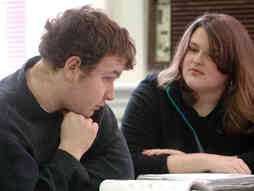Carpenter (2015) tells us that more than half of young adults with autism are disengaged from both #employment and #education, two years after leaving high school. He believes it is because of the following major remaining challenges of autism, into adulthood –
- Remembering & following instructions
- Adapting to changes & generalizing
- Planning & organizing
- Interpreting body language & facial expressions
- Making small talk & socializing
- Following unspoken social rules & expectations
Carpenter continues – social difficulties may frustrate college and career ambitions. And, in some regional areas, only the most severely disabled people are eligible for support or assistance, such as Medicaid-funded services.
Gardner (2013) marvels, I saw my son emerge from the changing rooms, and my soul swelled. What a handsome grown man he had become! Remembering that lost and lonely child, that child who had spent days rocking in a corner of a room, unable to communicate or relate, I thought, “Wow! Look at my incredible, handsome son now!
Heading off to college, Dale needs an awful lot of support and direction. He needs extra time if he’s to achieve his goals.”
< My Thoughts > “Dale needs an awful lot of support and direction.”
Throughout life, those with autism need support to a greater extent than the typical person learning a new task or operation. One suggestion in the literature has been that the designers of supported environments and educational settings find ways to compartmentalize and label tasks or operations, for persons with autism. For instance, incorporate more easily identified blocks time, areas of space, and/or use of specific tools/technology to support the adolescent and/or young adult, or adult with autism meet the challenges of their tasks.
Bowler, et al. (2015) tell us that the difference between ‘supported’ and ‘unsupported’ tasks was revealed in their study. Participants with autism found that having the ‘support’ of seeing things in a specific order, as with an organizational chart or by being given auditory cues, helped them become more effective. Having that type of support improved recognition as to the order of events or sequence.
They went on to say that those with autism have different degrees of difficulties with memory and may need to be cued to recall or recognize steps in a task or function. In the ‘discussion’ of the results, it was suggested that future support of persons with autism should be a result of spending time understanding and unpacking and clarifying the complexity of the task. These are reasonable adjustments required by most students and/or employees with autism, in order to become successful.
< My Thoughts > “To make reasonable adjustments…”
When a student has a disability, which impacts upon learning college curriculum or when learning a new job, then there may be a requirement to undertake reasonable adjustments. These reasonable adjustments would help student performance, or addresses employee needs, allowing for the individual’s strengths and abilities of the persons with autism to surface.
Help from academia and from employers for persons with autism could come by –
- providing necessary tutoring, technology, reframing, or retraining
- offering alternative tasks or assignments
- insuring longer supported training or length of assignment periods
- allowing more time off for rehabilitation, as needed
- permitting additional breaks, as needed
- changing inaccessible areas, or redesigning an area, as needed
- relocating work/study areas to address sensory, or other needs
< My Thoughts > “…using technology to help support…”
Here is a LINK to what appears to be a very recent collection of technology support tools used to train or retrain persons with disabilities, including autism – “New resources & hidden gems from the NationAl Rehabilitation Information Center (NARIC) Collection. A Quick Look at the Research, a ‘Spotlight’ collection –
https://naricspotlight.wordpress.com/2021/04/07/autism-and-technology-for-independence-a-quick-look-at-the-research/
Disclaimer: Please note that I, Sara Luker do NOT have any connection with, nor am I a representative of the National Rehabilitation Information Center (NARIC). This LINK is offered only as an opportunity to begin to seek information of interest, regarding the use of technology for support to persons with disabilities.
Wentz believes that because the traditional ‘face-to-face’ communication is difficult for most individuals with autism, a computer-mediated communication from one’s residence was thought to be an easier facilitation of support. The coaches available during this time period included clinical psychologists or educational therapists with the common denominator of having vast experience with this Autism Spectrum Disorder (ASD) population.
Jones (2016) insists that it’s clearly time to admit that some Autistics – even some highly educated Autistics – are NOT going to be able to work. We need more legitimate work-at-home opportunities, more support and assistance at finding and keeping online employment. And, a lot of help in getting disability benefits for those who aren’t able to work full-time or at all.
Staff Writer (2018) states that so much is riding on the future, so that an autistic adult can live independently. That the time is now for gathering information, discussing possibilities, and to start working towards milestones for independence.
REFERENCES
Bowler, D. Galgg, S., et al. (2015). Brief Report: The Role of Task Support in the Spatial and Temporal Source Memory of Adults with Autism Spectrum Disorder; Journal of Autism Developmental Disorders; V45, p.2613 - 2317.
Carpenter, S. (2015). Learning Through Seeing & Doing; Science News, p18-20.
Gardner, N. (2013). All Because of Henry; eBook Edition.
Jones, S.R. (2016). The ABCs of Autism Acceptance; eBook 2016 Edition.
Staff writer (2018). Are There Ways An Autistic Adult Can Live Independently?; Retrieved online from – https://ecarevault.com/2018/01/autistic-adults-can-live-independently/
Wentz, E., Nyden, A., et al. (2012). Development of an Internet-based Support and Coaching Model for Adolescents and Young Adults with ADHD and ASD; A Pilot Study; Journal of Early Child & Adolescent Psychiatry; V:21, p611-622.

 RSS Feed
RSS Feed